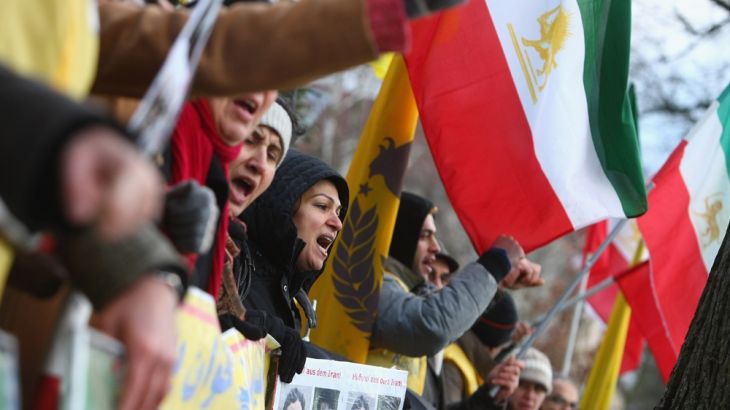
Iran: Economic reasons contributing to the unrest
We look at the challenges facing Iran post-sanctions and which economic factors are contributing to the current unrest.
Almost a year on after sanctions were lifted from Iran, the Middle East’s second-largest economy remains a hard place to find a job. This is one of the economic factors contributing to the current unrest being felt across the country.
With an economy second only to Saudi Arabia, a population exceeding all in the region, barring Egypt – standing at 80 million people who call Iran home – and over 50 percent of that figure is currently under the age of 30, the world has taken notice of the demonstrations in the country.
Keep reading
list of 4 itemsLoad shedding & water woes: Can South Africa fix its ailing infrastructure?
Why is Biden ratcheting up the trade war with China?
‘We love Taiwan’: Domestic workers hope for more from new President Lai
The Iranian economy has the potential to grow but it is relatively inefficient at this stage.
Since the New Year, thousands have taken to the streets over rising prices and economic mismanagement; the biggest show of public dissent in the country since pro-reform rallies took place in 2009. Since then, the importance of social media to spread awareness and organise has been acknowledged and embraced by Iranians. This realisation prompted the Iranian government to temporarily shut down powerful online platforms like Instagram and messaging service Telegram, blaming outside interference for the disorder.
Dr Bijan Khajehpour, an economist and managing partner at Atieh International, a Vienna-based strategic consulting firm, says there are a number of economic phenomena in Iran contributing to public dissatisfaction.
“High prices … unemployment is a key factor … Iran has a very educated young population and a lot of these educated citizens are unemployed … 25-26 percent of that is youth unemployment … there is a direct correlation between the level of unemployment and the protests,” he says.
Khajehpour also highlights the basis behind claims of corruption as a driving factor of the protests saying, “There is a feeling, or what I would call a ‘heading’ for all of these issues, I would say that the Iranians feel there is injustice in the country. There is corruption, there is mismanagement.”
As post-sanctions Iran continues to struggle and foreign investors continue to be wary of putting their money into the country, the question remains: How important is foreign investment to Iran, especially in light of current conditions?
“Foreign investment is very, very significant. Not just because capital will flow into the economy, but also because new technologies and also new management concepts will flow into the country. Mismanagement and inefficiency are part of these issues and can be addressed through efficient foreign investment and through different concepts and knowledge that can be transferred into the country,” says Khajehpour.
Hardware flaw scandal
Meltdown and Spectre are the nicknames for two major flaws discovered in the hardware of nearly every computer and digital device worldwide … and the race is on to fix them.
A design change made to computer chips over a decade ago opened up access for hackers into nearly every computer and digital device. Companies involved include Apple, Microsoft and Google, while the flawed chips were actually manufactured by Intel, Arm Holdings and AMD.
The good news is that we now know about the flaw in the hardware. The bad news is that fixing it will slow your machine down.
“Normally, security researchers go to great efforts to keep [their findings] secret … they tell the people who are affected and give them time to develop a software solution and then we all get to hear about it. In this case – embarassingly for the chip companies, the information has leaked before the fix is widely available … this certainly doesn’t happen on this huge scale,” says IT consultant Adrian Mars.
Ecological credit crunch
Climate change is being felt across the globe, and especially so in low-lying islands like Cuba. Rising water levels are causing the island nation to shrink and many senior global economists are warning about a looming ecological credit crunch.
Ecological debt is defined as the excess consumption of natural resources, over and beyond the earth’s capacity to regenerate.
Chief global economist at UBS, Paul Donovan, says, “We are consuming about one and a half planets’ worth of resources every single year. Our current standard of living requires us to borrow natural resources from future generations … clearly, that’s not sustainable. If we run into a point where we can no longer overuse environmental resources, there will be a fairly dramatic drop in our standard of living.”
Also on this episode of Counting the Cost:
New EU finance rules: In the biggest trading overhaul since the financial crisis, the EU has rolled out new guidelines that call for more accountability, that banks pay their due for research and more protection and information afforded to investors.
VAT rollout for UAE and KSA: The United Arab Emirates and Saudi Arabia have rolled out value-added tax for the first time, to mark the new year. In an attempt to diversify their economies, both Gulf states have applied the five percent tax, applicable to most goods and services, as part of a step away from reliance on oil and gas.
Gazan money struggles illustrated: Plus, the daily money struggles of people in Gaza told through cartoon characters.